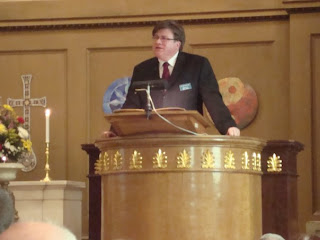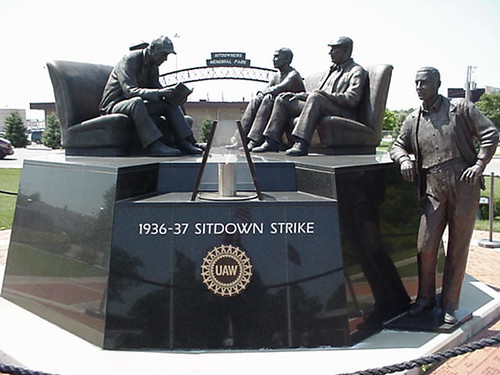 I woke early, sleeping throughout the night only, I think, because I took a couple of anti-histamine last night that knocked me out. After weeks of working and worrying and just waiting, I was about to assume my new call as Minister of the First Unitarian Church of Baltimore (Universalist & Unitarian). You can guess that I'm excited.
I woke early, sleeping throughout the night only, I think, because I took a couple of anti-histamine last night that knocked me out. After weeks of working and worrying and just waiting, I was about to assume my new call as Minister of the First Unitarian Church of Baltimore (Universalist & Unitarian). You can guess that I'm excited.I rose to take a brief walk in my new neighborhood, Bolton Hill. Just a few blocks from the rowhouse that will be home for the next year or so, Eutaw Place provided a very pleasant garden boulevard in which to walk. The gardens themselves provide little "events" as I walked from block to block, and the variety of shapes of gardens, the mixing of symmetrical and asymmetrical forms, the straight paths ans the "S" curves made it quite delightful.
At the top of the park is the monument to Francis Scott Key, its gilded statue towering above columns and ship and fountain and battle. What a hoot! It is the kind of installation that requires attention, If the waters were not flowing, the perspective just wouldn't work. If the flag-bearer were not so brilliantly shining, the entire piece could easily look abandoned, lost.
Still, cared for and functioning, what a heroic piece it is, the water making it even more pleasant as my walk is beginning to make me rather warm.
Walking toward home, I stop for a moment to see up close the schul which has been a marker for me when I'm trying to figure out where to turn to get home. But it isn't a synagogue any more; it is a Prince Hall Masonic Temple, acquired in the 1960s as Temple Oheb Shalom was moving to their new Walter Gropius designed facilities in Pikesville. It is an impressive Moorish-revival building with a huge dome topped by a star of David. I wonder what the interior looks like today . . .
I stop at the coffee shop a block and a half from home and have a latte while listening to NPR on my iPhone. (Oh dear, who have I become?) There are plenty of young people coming and going, and the "Do Not Park" signs in front of the cafe provide an excellent place for people to park their cars, risking tickets, as they run in to pick up a little joe.
I get home and jump into the shower, giving up on one radio that has many buttons but whose power button seems no longer to work. (I can tune the thing, though, and even set favorite channels. Just can't figure out how to turn 'em on anymore.) The warm water is slow to arrive from the basement, and I so don't want to waste that I start with a good cold shower. Of course, this means that some hot water will be filling the pipes and then cooling down as the day goes by. Ah! hot water on demand!
After some toast (homemade bread by Pat) with cottage cheese and tomato, I finally get out of the house and turn on the timer on the phone to see how long it will take to get to the church. Seventeen and a half minutes later, I arrive a little sweaty, but beaming. At long last, this new place, this new challenge, this new opportunity.





